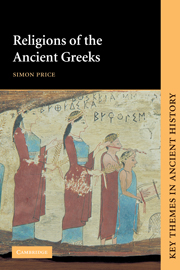Book contents
- Frontmatter
- Contents
- List of figures
- Preface
- List of abbreviations
- 1 Introduction
- 2 Gods, myths and festivals
- 3 Religious places
- 4 Authority, control and crisis
- 5 Girls and boys, women and men
- 6 Elective cults
- 7 Greek thinkers
- 8 Reactions to Greek religions
- Appendix of Greek inscriptions in translation
- Bibliographical essay
- Bibliography
- Index
- Frontmatter
- Contents
- List of figures
- Preface
- List of abbreviations
- 1 Introduction
- 2 Gods, myths and festivals
- 3 Religious places
- 4 Authority, control and crisis
- 5 Girls and boys, women and men
- 6 Elective cults
- 7 Greek thinkers
- 8 Reactions to Greek religions
- Appendix of Greek inscriptions in translation
- Bibliographical essay
- Bibliography
- Index
Summary
The previous chapter considered cultic options, distinct from the official range, which offered new ideas about the creation of gods and mortals, and new forms of religious belonging. In this chapter the focus is on Greek thinkers, philosophers and others, who distanced themselves from mythology and theology in favour of their own articulate views of the world. In approaching these thinkers it is tempting to employ the model of the eighteenth-century French Enlightenment; self-styled philosophers rejected the teaching of the church and avowed the supremacy of ‘rational thought’, setting faith against atheism, belief against unbelief. As we shall see, it is profoundly misleading to talk of ‘the fifth-century Enlightenment’; it is also quite misleading to treat Hellenistic philosophical schools as populated by crypto-sceptics, responding to an alleged decline in belief in civic gods.
In the first place, there was no articulate body of belief for philosophers to reject. Greek religion was not like Christianity, which elevated belief in a central set of dogmas as a defining characteristic of the religion. There were commonly accepted ideas about the gods and about the appropriate ways of relating to them, but these remained generally inarticulate. The absence of an explicitly formulated and dynamic theology is due partly to the conservative influence of Homer and Hesiod, and partly to the absence of a professionally trained, vocational priesthood, which could have developed, internal to the religious system, an explicit ‘creed’.
- Type
- Chapter
- Information
- Religions of the Ancient Greeks , pp. 126 - 142Publisher: Cambridge University PressPrint publication year: 1999



